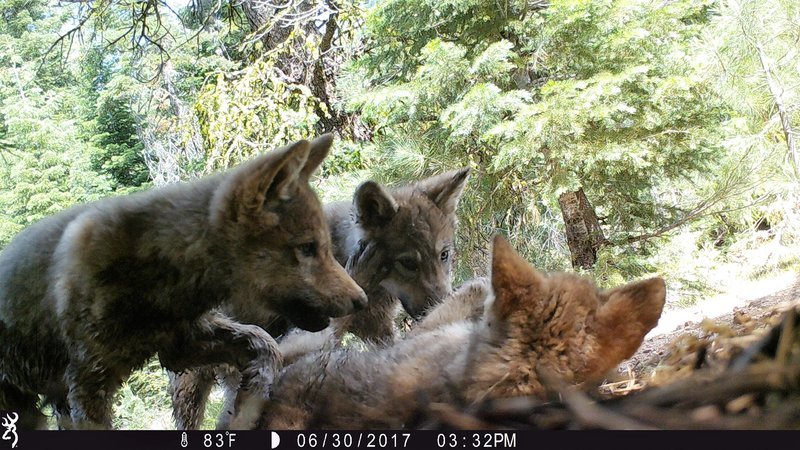New Endangered Gray Wolf Pack Discovered in California’s Sierra Nevada
One adult female and four cubs have been detected in Sequoia National Forest, bringing hope to conservationists that wolves in the state are beginning to thrive amidst federal protections.
A new gray wolf pack has been spotted in the Sierra Nevada, with environmental activists celebrating the news as a much-needed step forward for the species.
The pack was first discovered in the Sequoia National Forest in Tulare County, the California Department of Fish and Wildlife (CDFW) reported. Its five known members include an adult mother and her four pups, two females, and two males.
“This recently detected group of wolves is at least 200 straight-line miles from the nearest known California pack and demonstrates the species’ amazing ability to disperse long distances and take advantage of the state’s plentiful suitable habitat,” Pamela Flick, California program director for Defenders of Wildlife, said in a statement.
Wildlife officials examined the tracks and collected droppings and fur samples for genetic testing, identifying the adult female as a direct descendant of the first gray wolf detected in California in nearly 90 years, known as OR-7. In 2011, OR-7, became the first wolf in almost a century to venture into California from Oregon.
When OR-7 arrived in California, activists successfully urged the state to grant full protection to wolves through California's Endangered Species Act. Conservationists believe that he eventually roamed back to southwestern Oregon, where he found a mate.
“The incredible contributions of pioneering wolf OR-7 endure, with one of the newly detected adult females being his direct descendent,” Flick continued. “We are thrilled to see gray wolves thriving in the Golden State and making their way to more areas of the state, which now includes the majestic Sequoia National Forest.”
The new pack is only the fourth to establish itself in California in the last century. This group joins the Lassen pack, which ranges across parts of Lassen and Plumas Counties; the Whaleback pack, which ranges across eastern Siskiyou County; and the Beckwourth pack, whose territory is in eastern Plumas County.
Lassen Pack, 2017. Credit: California Department of Fish and Wildlife
“It brings me great joy to see California’s wolves continue to increase in number, aided by the strong state and federal protections here,” Amaroq Weiss, senior wolf advocate with the Center for Biological Diversity said in a statement when the wolves were first spotted in May. “Wolves rewild the landscape and that’s good not just for the wolves but for entire ecosystems.”
Although originally native to California, the gray wolf was trapped and hunted to extinction in the area during the 1920s. The species has only begun to make a return in the last decade, with a few individuals venturing back across state lines.
Wolves in California are also safeguarded under the federal Endangered Species Act. But, in nearby states, wolves have been removed from the protection of the act due to pressure from the ranching industry. This group profits greatly from grazing their cows on public lands and is opposed to sharing the space with native species like wolves.
Hunters in Idaho can shoot or trap an unlimited number of wolves year-round on private land, which could decimate 90 percent of the state population. In Montana, hunters can kill up to 20 wolves a year, and in Wyoming, hunters can kill as many wolves as they like in 85 percent of the state.
Changing the Narrative for Wolves
For the past year, Species Unite has been fighting to raise awareness of America's war on wolves. And now, we are proud to announce the launch of our first-ever humane education in schools program. Designed to teach children about the importance of protecting wolves to maintain a balanced ecosystem, this program is a crucial step in building a new generation of animal activists. Learn more here.
We Have A Favor To Ask…
Species Unite amplifies well-researched solutions to some of the most abusive animal industries operating today.
At this crucial moment, with worldwide momentum for change building, it’s vital we share these animal-free solutions with the world - and we need your help.
We’re a nonprofit, and so to keep sharing these solutions, we’re relying on you - with your support, we can continue our essential work in growing a powerful community of animal advocates this year.
More stories:
Species Unite
A collection of stories of those who fight the good fight on behalf of animals.





The production process involves confining 12-week-old ducks and geese in small, dark pens for weeks, during which they are force-fed.